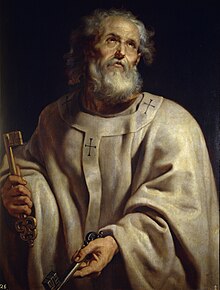Simon Peter
|
Pope Saint Peter |
|
|---|---|
| Apostle, preacher, pope, Patriarch and martyr | |

|
|
| Church | Early Christian Church |
| See | Rome, Antioch |
| Papacy began | AD 30 |
| Papacy ended | between AD 64 and 68 |
| Predecessor | Inaugural holder (first pope) (First Patriarch of Antioch) |
| Successor |
|
| Orders | |
| Ordination | AD 33 by Jesus Christ |
| Personal details | |
| Birth name | Shimon (Simeon, Simon) |
| Born | ca. 1 AD Bethsaida, Gaulanitis, Syria, Roman Empire |
| Died | between AD 64 and 68 Clementine Chapel, Vatican Hill, Rome, Italia, Roman Empire |
| Parents | John (or Jonah or Jona) |
| Occupation | Fisherman, clergyman |
| Sainthood | |
| Feast day | Main feast (with Paul the Apostle) 29 June (Catholic Church, Eastern Orthodox Church, Oriental Orthodoxy, Anglicanism, Lutheranism) Chair of St Peter in Rome 18 January (Pre-1960 Roman Calendar) Confession of St Peter 18 January (Anglicanism) Chair of St Peter 22 February (Catholic Church) St Peter in Chains 1 August (pre-1960 Roman Calendar) |
| Venerated in | All Christian churches that venerate saints |
| Canonized | Pre-Congregation |
| Attributes | Keys of Heaven, pallium, papal vestments, rooster, man crucified upside down, vested as an Apostle, holding a book or scroll. Iconographically, he is depicted with a bushy white beard and white hair. |
| Patronage | Patronage list |
| Shrines | St. Peter's Basilica |
Saint Peter (Syriac/Aramaic: ܫܸܡܥܘܿܢ ܟܹ݁ܐܦ݂ܵܐ, Shemayon Keppa, Arabic :شمعون الصفا Shamaon Safa, Hebrew: שמעון בר יונה Shim'on bar Yona, Greek: Πέτρος Petros, Latin: Petrus; r. AD 30; d. between AD 64 and 68), also known as Simon Peter, Simeon, or Simōn ![]() pronunciation , according to the New Testament, was one of the Twelve Apostles of Jesus Christ, leaders of the early Christian Church. He is also the "Apostle of the Apostles", an honor 3rd-century theologian Hippolytus of Rome gave him, and the first pope of the Roman Catholic Church, ordained according to Catholic teaching by Jesus in the "Rock of My Church" dialogue in Matthew 16:18. The ancient Christian churches all venerate Peter as a major saint and associate him with founding the Church of Antioch and later the Church in Rome, but differ about the authority of his successors in present-day Christianity.
pronunciation , according to the New Testament, was one of the Twelve Apostles of Jesus Christ, leaders of the early Christian Church. He is also the "Apostle of the Apostles", an honor 3rd-century theologian Hippolytus of Rome gave him, and the first pope of the Roman Catholic Church, ordained according to Catholic teaching by Jesus in the "Rock of My Church" dialogue in Matthew 16:18. The ancient Christian churches all venerate Peter as a major saint and associate him with founding the Church of Antioch and later the Church in Rome, but differ about the authority of his successors in present-day Christianity.
...
Wikipedia
